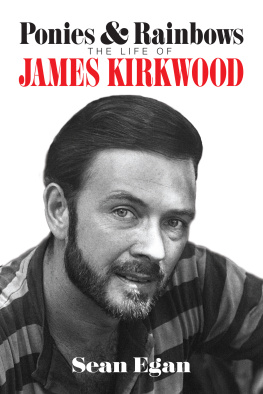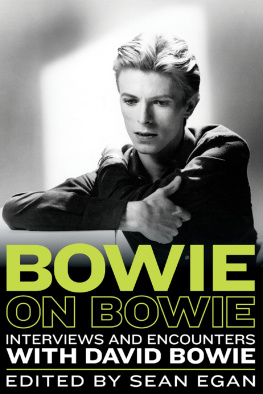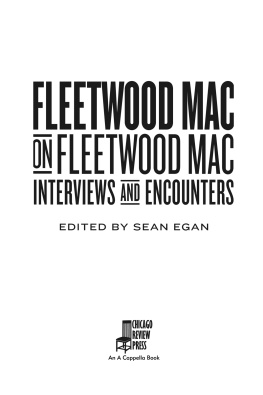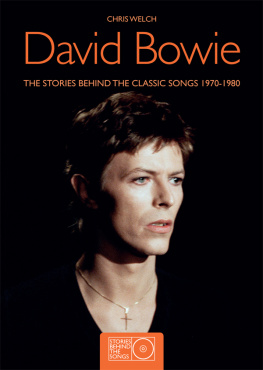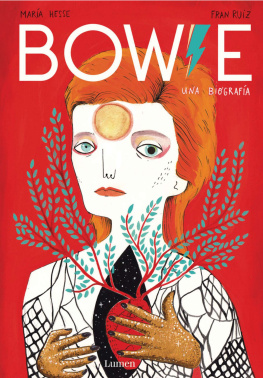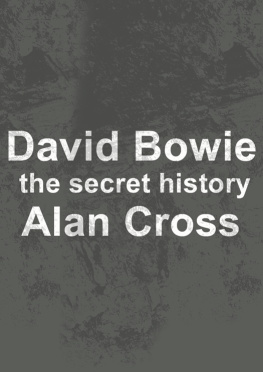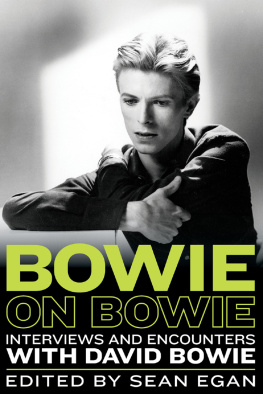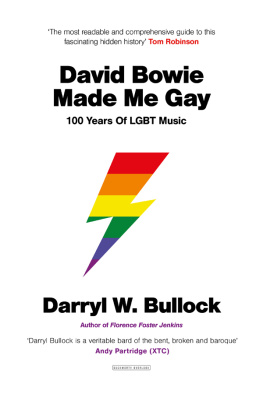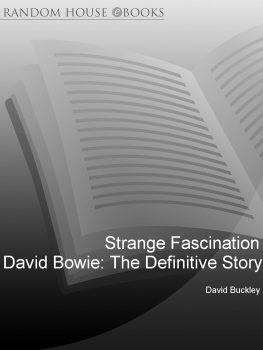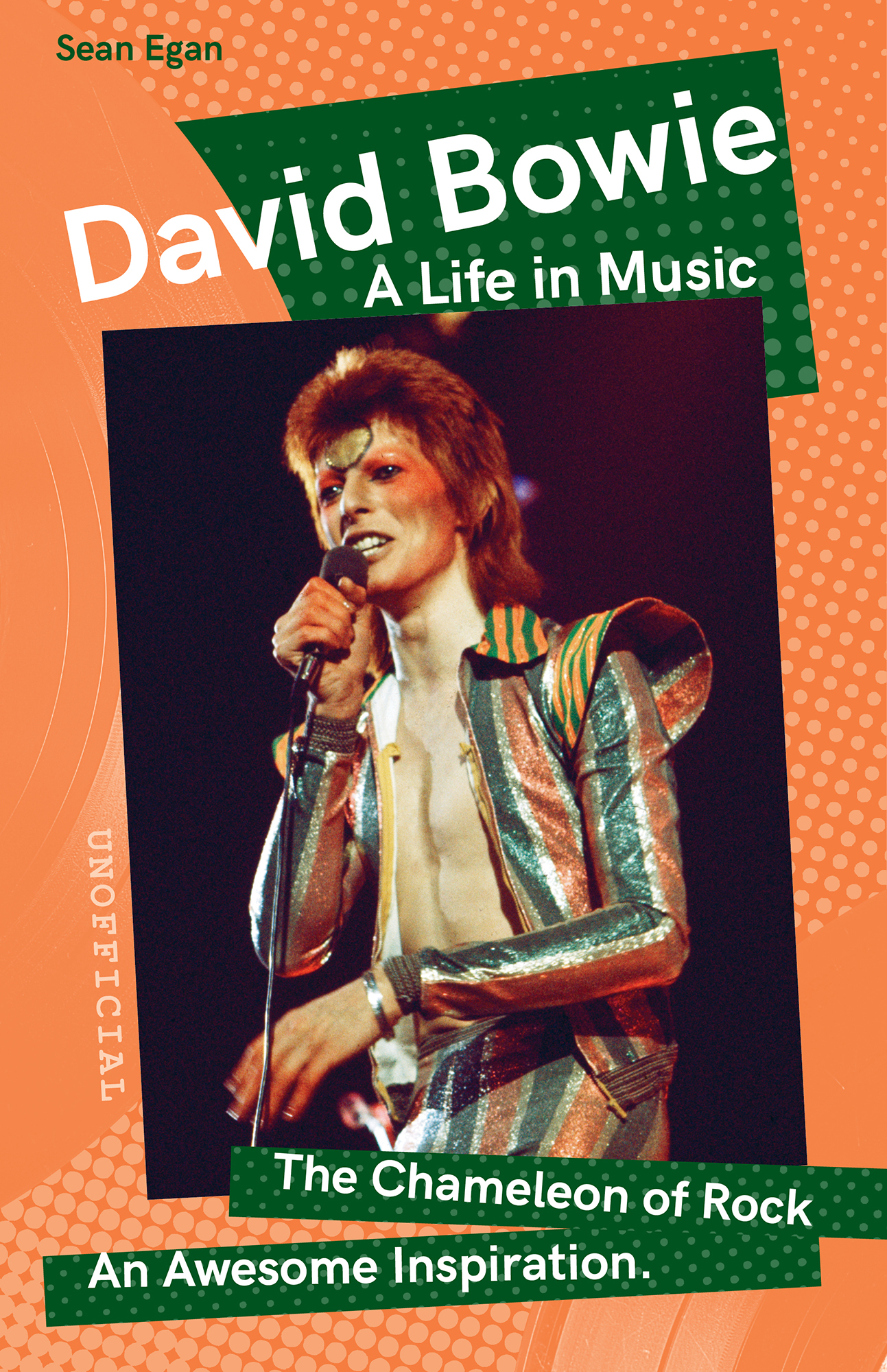Foreword
Z iggy Stardust and the Spiders From Mars was released the year I was born. Songs like Changes and Starman were as familiar as The Wheels On The Bus, and Lets Dance and Modern Love sound-tracked my school discos, but it wasnt until a chance encounter with Hunky Dory at 14 that I was confronted with the enigmatic genius of the former David Jones. I heard Life On Mars and it was an Aladdin Sane lightning ash to the frontal cortex. Bowie had contacted me through space, time and black plastic. I was dumbfounded by its otherworldly beauty and moved to tears.
The music shook me, but the man, or perhaps the myth, the hair and Freddie Burretti lapels sealed the obsession. The wild-eyed boy from Bromley took me on a fantastic voyage through post-apocalyptic dystopias ruled by Diamond Dogs, alien rock gods and addict Pierrot spacemen. He guided me into the underground of New Yorks gay scene and out of the underground of Goblin King Jareth even when Bowie lost his way in the labyrinth of the 1980s he was still amazing.
His impact on popular culture has been inestimable, but frankly its still not enough. Every pop star should ask themselves: What would David Bowie have done? Good luck answering that. Instinct, genius and charisma cannot easily be devoured and regurgitated; though it has been fun watching artists like Lady Gaga try.
When Bowie died in January 2016, millions of fans across the world mourned. Its fair to say that Ive never seen anything like the outpouring of love that followed. The man inspired generations of musicians and artists, electricians, social workers, architects, coders. How would we live without him?
Thank god we dont have to. The brilliant V&A exhibition Bowie Is was accompanied by whimsical sub-heads such as Bowie Is Photographic, Bowie is The Subject, and we could add to that list, Bowie is Immortal, for not only does new music seem to appear with satisfying regularity, his peerless catalogue of music is still here. Im listening now.
Hunky Dory is still my favourite Bowie LP, but Ziggy , Diamond Dogs and Low come close, then theres Lodger, 1. Outside , and Black Star its hard to narrow it down, to quote the opening track on s top hit album Toy, everythings spent and I dig everything.
Malcolm Mackenzie
Take A Bow
If anything maybe Ive helped establish that rocknroll is a pose.
David Bowie, 1975
Y oung mod. Hairy hippie. Ziggy Stardust. Aladdin Sane. Halloween Jack. The Thin White Duke. Plastic Soulman. Godfather of the New Romantics. Tin Machinist.
Across the course of his four decades-plus career, David Bowie (19472016) adopted more personas and musical genres than just about any other musical icon. He viewed his music and public profile as intertwined, at one point having a different image for each new album. Thus, he not only brought to pop a new theatricality but he also kept the world intrigued and waiting for the next instalment of his glittering career.
Not Just A Pretty Face
Sometimes lost in all of this was the fact of Bowies vast musical talents. Throughout the 1970s, at a point where many people had assumed rock had been taken as far as it could go, he broadened the mediums parameters with a sequence of ground-breaking albums. The Man Who Sold The World (1970) was that contradiction: intellectual heavy metal. Hunky Dory (1971) was a jaw-droppingly skilful and diverse display of alternative songwriting. Ziggy Stardust (1972) was a blatant tilt for mainstream success whose cynicism could not blunt its brilliance. Aladdin Sane (1973) spat in the face of his new teen idol status with profanities, sexual explicitness and discordant piano. Young Americans (1975) saw him become a soul man, although his soul was typically of a deliberately arch style. Station to Station (1976) found him taking pop into epic, elegant pastures. Then there was the Berlin Trilogy of Low (1977), Heroes (1977) and Lodger (1979), in which he spurned anything resembling the commercial with electronic and ambient experimentalism.
This type of rollercoaster artistic trajectory is rarely embarked upon by recording artists because, by definition, comprehensively overhauling your sound runs the risk of turning off your original fans. Bowie caused his devotees to confront their reasons for buying his product over and over again. Each time, he emerged unscathed indeed, triumphant as his fanbase learned to love and expect his reinventions.
Low Points
This is not to say that Bowie did not have career troughs. His surrendering to fashionable empty gloss on Lets Dance (1983) and Tonight (1984) in the Eighties was financially savvy but lost him fans who could forgive any career direction except pedestrianism. Meanwhile, his sublimation of himself into the group Tin Machine in the late Eighties/early Nineties was an act of self-sacrifice and daring rendered pointless by the ensembles mediocrity.
Yet, ever the contrarian, Bowie refused to let this become the narrative of the long artistic decline of the likes of The Who or The Rolling Stones: at a point where many had given up on him, he hauled himself back to artistic credibility with a series of albums that showed that he alone of his generation of artists was interested in embracing musical forms that had not existed when he made his first record.
I got into rock because it was an enjoyable way of making my money and taking four or five years to puzzle my next move out.
David Bowie
Back With A Bang
It was because of this that the announcement in 2013 of The Next Day his first new album in 10 years was greeted not with a so what? but instead with genuine excitement. True to form, Bowie did not let anyone down when it came either to intriguing imagery, playing cat and mouse with the media or artistic worth.
His reappearance made anyone who had forgotten, or been given cause for doubt, realize all over again that David Bowie was truly a unique star in the musical firmament.
True to form, Bowie was creating art right up until his death. On January 8 2016, Bowies 69th birthday, he released his final album, Blackstar , and died just two days later of cancer, an illness he had kept private. The producer Tony Visconti called Blackstar Bowies parting gift.
Im going to be huge and its quite frightening in a way because I know that when its time for me to be brought down, it will be with a bump!
David Bowie, 1971
David Jones
I spent all those formative teenage years adopting disguises and changing roles just learning to be somebody.
David Bowie
A s is the case with pretty much all stars, before the beautiful buttery came the unremarkable caterpillar.
Bowie was born not on Mars but in Brixton, South London. He started life as David Robert Jones on 8 January 1947. His father was a promotions officer for the childrens charity Barnardos and his mother a cinema usherette. He had one sibling half-brother Terry who had, like much of the extended family, severe mental problems. By the time Bowie was six, the family had moved to Bromley in Kent.
School Ups And Downs
Although he was precocious at the recorder and school mime lessons, young Jones was not so academically gifted as to pass the old eleven-plus exam. Aged fifteen, while he was at Bromley Technical High School, he got into a fight with one George Underwood over a girl. A facial punch saw Jones hospitalized for several months with what eventually turned out to be a permanently injured eye. The consequent dilation of its pupil gives the illusion in photographs of it being a different colour to his other eye. This surreal sight aided his attempt to portray himself as an extra-terrestrial rocker in the early Seventies. Amazingly, Jones and Underwood remained friendly, with the latter designing the artwork for early Bowie albums.


